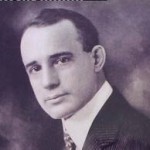The Trait of the 95% of the Population Who Fails
Napoleon Hill, in “The Law of Success,” states that the population in the United States fails at the endeavors of life. Not that you need assistance in subtracting, but that means that only 5% of the population succeeds. Now this was in the early 20th Century, but I fear the percentages are no better now in the early 21st Century. What is lacking in individuals that results in 95% of the people being unhappy, as unhappiness is the result of failure? Do you know?
According to Napoleon Hill, the primary reason people fail is that they have no definite purpose to their lives. What is known as existential psychology would say that people do not have meaning in their lives. If you have no definite purpose you are like a sailing vessel roaming the vastness of the ocean without a rudder. You use your vast store of energy only to move in circles.
Once you establish your definite purpose in life, you now know your direction in life. You have a destination in life that acts as a beacon guiding you on your way. You need three additional items in addition to your definite purpose to move you towards success.
Definite Plans will take you from point “A” to point “B.” If you decide to go on a journey you need more than a rough idea of where you are going. For example, traveling from Houston, Texas to Omaha, Nebraska by car is pretty much due North. The problem is that going due North will not get you to your destination the easiest and most efficient way. You need a definite plan, also known as a roadmap, to get you where you want to go.
Power, according to Napoleon Hill, involves gathering together a group of people who have the knowledge, wisdom and skill to assist you in getting to your destination. Having access to these accomplished people is only a small part of the equation. You have to utilize what they know and act upon it. Having people available is only potential power unless you ignite it with your action.
Proficiency in the skills are needed for what you have chosen to do. You can have all the knowledge in the world at your fingertips, which you do through libraries and the internet, but if you do not learn those skills and then practice them, they are useless to you. There are many people who believe they are an expert because they have read a book or received a college degree. It is only when you have mastered the information you have learned through action that you can achieve your definite purpose.
Today, it seems that most people want to achieve the status of great wealth or accomplishment without having to go through the necessary learning process. Book learning is not enough. You have to train your mind and your body in how to implement what you have learned. Consider this question, would you fly solo in a jet after having only read all the books available on how to take off, fly and land a jet? You might be willing to take the controls when someone else has you in the air, but wouldn’t you give them back when it came time to land? If you don’t, you have a very slim chance of making it through your flight alive.
This is true with your definite purpose. Learn the necessary knowledge, gather your support team and then put your plan in action after you practice or have worked with a mentor.


